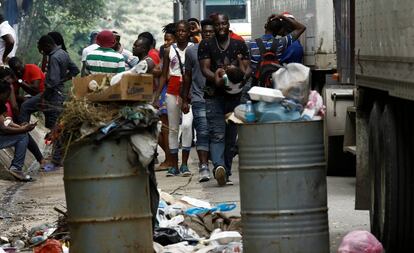Nicaragua’s closed-border policy pushes migrants to take desperate measures
Sandinista government’s increasingly tough line leaves thousands stranded in camps in Costa Rica


African migrants trapped on the border between Costa Rica and Nicaragua, as they try to make their way up through Central America, are resorting to increasingly desperate measures to reach their goal of reaching the United States.
On Sunday, some 25 men and women were abandoned by people-traffickers after their boat ran aground just off the remote Masapa beach on Nicaragua’s Pacific coast.
The migrants told local people who came to their rescue that they had boarded a motor boat in Costa Rica, to the south, that was supposed to take them north to Honduras but that they had run into problems.
People will continue to help, whether openly or in secret
Martha Cranshaw of NicasMigrante
More than 4,000 people have been stuck in makeshift camps along Costa Rica’s border with Nicaragua for several months after the Nicaraguan authorities refused them entry. Most of the would-be migrants are from Congo, Senegal and Togo, as well as others from Haiti and Cuba.
Local fishermen alerted residents in the nearby village of El Tamarindo, who brought water, food and blankets for the stranded migrants.
They then took the migrants, some of them suffering from exhaustion and sunstroke, to El Tamarindo’s evangelist church. Within hours, however, Nicaraguan riot police arrived at the village with the intention of rounding up the Africans and taking them back to Costa Rica. They were initially confronted by local people who refused to allow them into the church. The police responded with baton charges, tear gas and by firing rubber bullets. Eventually, police stormed into the church, beating several of the migrants and then forcing them onto buses.
“One police officer threatened me and said I had no right to help the blacks,” said Ana Julia Jiménez, a resident of El Tamarindo.
“We are all Sandinistas [the ruling party led by Daniel Ortega], but after this, nobody here will vote for them,” added Marco Parrales, another local resident.
Nicaragua goes to the polls in November to elect a new president, a process that has been called a “farce” by opposition parties.
More than 4,000 people are stuck in camps along Costa Rica’s border with Nicaragua
The Ortega government has taken a tough line with people trying to cross through the country on their way to the United States. In November 2015, it sent more than 1,000 Cubans back to Costa Rica.
“Where is the love and peace that Ortega is always talking about? Let these people through!” said Tirsa Dávila, a resident of El Tamarindo.
In another incident, despite efforts by the Nicaraguan authorities to silence the news, it was reported that 10 people drowned trying to cross a river along Nicaragua’s border with Costa Rica in August.
The following month, the government arrested Nilamar Alemán, a teacher who had helped a 27-year-old woman from the Congo after she turned up in her village of San Juan del Sur, a tourist resort on the Pacific coast. Alemán was charged with people trafficking and arrested.
But the angry public response forced the government to back down, and Alemán has since been released from jail and held under house arrest.
“Criminalizing people is a way of trying to silence the feelings that local people have shown toward these citizens of the world,” says Gonzalo Carrión of the Nicaragua Human Rights Center.
“People will continue to help, whether openly or in secret,” adds Martha Cranshaw of NicasMigrante, an NGO set up to help migrants making their way through Central America.
English version by Nick Lyne.
Tu suscripción se está usando en otro dispositivo
¿Quieres añadir otro usuario a tu suscripción?
Si continúas leyendo en este dispositivo, no se podrá leer en el otro.
FlechaTu suscripción se está usando en otro dispositivo y solo puedes acceder a EL PAÍS desde un dispositivo a la vez.
Si quieres compartir tu cuenta, cambia tu suscripción a la modalidad Premium, así podrás añadir otro usuario. Cada uno accederá con su propia cuenta de email, lo que os permitirá personalizar vuestra experiencia en EL PAÍS.
¿Tienes una suscripción de empresa? Accede aquí para contratar más cuentas.
En el caso de no saber quién está usando tu cuenta, te recomendamos cambiar tu contraseña aquí.
Si decides continuar compartiendo tu cuenta, este mensaje se mostrará en tu dispositivo y en el de la otra persona que está usando tu cuenta de forma indefinida, afectando a tu experiencia de lectura. Puedes consultar aquí los términos y condiciones de la suscripción digital.








































